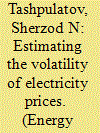| Srl | Item |
| 1 |
ID:
168654


|
|
|
|
|
| Summary/Abstract |
Domestic rooftop photovoltaic (PV) energy can reduce net electricity demand, and therefore reduce energy prices through a merit-order effect. This reduces profits of all incumbents in the electricity markets. In addition, in imperfectly competitive markets, PV self-generation reduces prices through a reduction in market power. The first effect may warrant additional policy interventions to maintain cost recovery, but the second is much more desirable, as it simultaneously helps increase sustainability and competition. However, unlike a simple reduction in market prices, the competition effect affects all incumbents differently. Since resistance from incumbents can be a significant barrier to energy policy change, it is important to understand the distribution of effects. This paper does so for the Spanish market. A Nash-Cournot model and a simplified representation of the Spanish electricity market is used to determine the merit-order and competition effects of an increase in solar self-generation. We conclude that both are important, and that their analysis is essential to inform the social debate around PV policy.
|
|
|
|
|
|
|
|
|
|
|
|
|
|
|
|
| 2 |
ID:
128385


|
|
|
|
|
| Publication |
2014.
|
| Summary/Abstract |
This paper presents an extensive analysis of the Greek electricity market for the next 7-year period (2014-2020) based on an hour-by-hour simulation considering five different RES technologies, namely wind, PV, small hydro, biomass and CHP with emphasis on PV integration. The impact of RES penetration on the electricity market operation is evaluated under two different models regarding the organization of the Greek wholesale day-ahead electricity market: a mandatory power pool for year 2014 (current market design) and a power exchange for the period 2015-2020 (Target Model). An integrated software tool is used for the simulation of the current and the future day-ahead market clearing algorithm of the Greek wholesale electricity market. Simulation results indicate the impact of the anticipated large-scale RES integration, in conjunction with each market model, on specific indicators of the Greek electricity market in the long-term.
|
|
|
|
|
|
|
|
|
|
|
|
|
|
|
|
| 3 |
ID:
124135


|
|
|
|
|
| Publication |
2013.
|
| Summary/Abstract |
Price fluctuations that partially comove with demand are a specific feature inherent to liberalized electricity markets. The regulatory authority in Great Britain, however, believed that sometimes electricity prices were significantly higher than what was expected and, therefore, introduced price-cap regulation and divestment series. In this study, I analyze how the introduced institutional changes and regulatory reforms affected the dynamics of daily electricity prices in the England and Wales wholesale electricity market during 1990-2001.
This research finds that the introduction of price-cap regulation did achieve the goal of lowering the price level at the cost of higher price volatility. Later, the first series of divestments is found to be successful at lowering price volatility, which however happens at the cost of a higher price level. Finally, this study also documents that the second series of divestments was more successful at lowering both the price level and volatility.
|
|
|
|
|
|
|
|
|
|
|
|
|
|
|
|